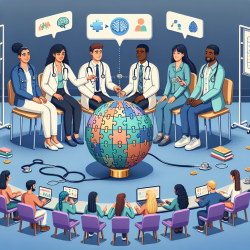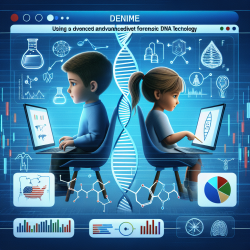Introduction
In the wake of the COVID-19 pandemic, professionals across various fields have had to adapt and respond to unprecedented challenges. For speech-language pathologists (SLPs), understanding the broader social and historical contexts of pandemics can provide valuable insights for improving practice and outcomes for children. The research article "Epidemics, pandemics, and social conflict: Lessons from the past and possible scenarios for COVID-19" offers a comprehensive analysis of how past epidemics have influenced social dynamics, including scapegoating and minority persecution. This blog explores how SLPs can leverage these insights to enhance their practice and contribute positively to their communities.
Understanding the Historical Context
The research highlights that pandemics have historically led to social conflicts, often exacerbating existing tensions and leading to scapegoating of minority groups. Understanding these patterns can help SLPs anticipate and mitigate similar issues in their practice. For instance, during the COVID-19 pandemic, certain communities have faced increased discrimination, which can impact children's access to speech-language services.
Implementing Data-Driven Strategies
SLPs can use data-driven approaches to identify and address disparities in service delivery. By analyzing demographic data and service utilization patterns, practitioners can identify underserved populations and tailor interventions to meet their specific needs. This approach not only improves access to services but also promotes equity and inclusion in speech-language pathology.
Promoting Social Cohesion and Empathy
The research suggests that pandemics can also foster social cohesion and empathy, as communities come together to support one another. SLPs can play a crucial role in promoting these positive outcomes by fostering inclusive environments and encouraging empathy and understanding among children. Activities that promote social interaction and communication skills can help build bridges between diverse groups and reduce the likelihood of social conflict.
Encouraging Further Research and Collaboration
To enhance their practice, SLPs should engage in ongoing research and collaboration with other professionals. By staying informed about the latest findings in epidemiology, social science, and speech-language pathology, practitioners can develop innovative strategies to address the challenges posed by pandemics. Collaborating with researchers and other healthcare professionals can also lead to the development of comprehensive, multidisciplinary approaches to service delivery.
Conclusion
By learning from historical pandemics and leveraging data-driven strategies, SLPs can improve their practice and contribute to positive outcomes for children. Understanding the social dynamics of pandemics can help practitioners anticipate challenges and develop effective interventions that promote equity, inclusion, and social cohesion. As we continue to navigate the COVID-19 pandemic, it is essential for SLPs to remain adaptable and committed to evidence-based practice.
To read the original research paper, please follow this link: Epidemics, pandemics, and social conflict: Lessons from the past and possible scenarios for COVID-19.










